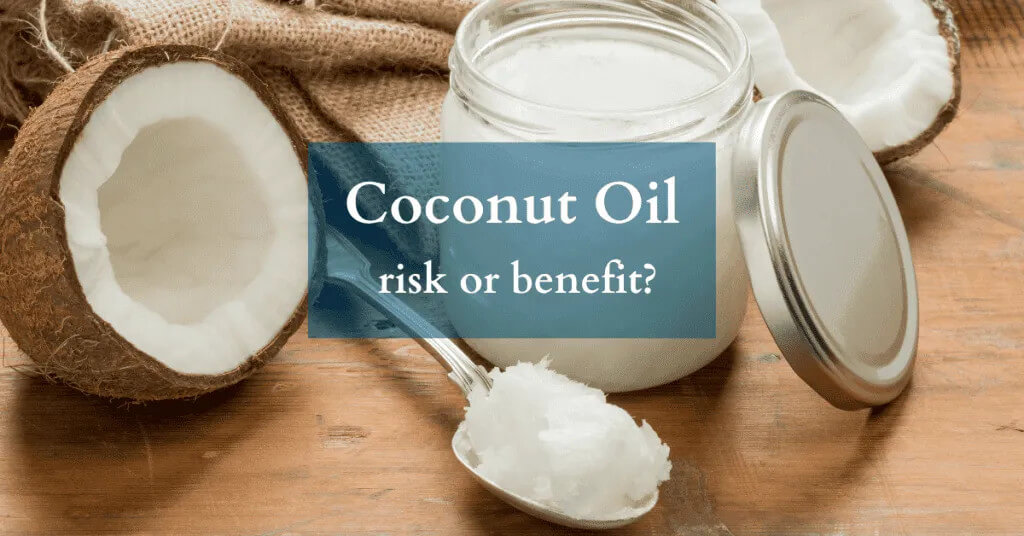
Coconut Oil
Coconut oil is not exempt from all of the controversy in nutrition – one week you’ll hear all the amazing benefits, the next week you’ll hear that it’s terrible for you and will cause all sorts of health problems. What should you believe? Today we’re going to break it down.
Risks and Controversies
- Saturated fat content: Saturated fats have been unfortunately demonized – but they’re actually the most stable types of fats, and they’re so safe that these are the types our bodies produce!
- Digestive issues: Some people report digestive discomfort, loose stools and urgency to bowel movements with too much coconut oil or when first adding it in. I recommend you add small amounts in slowly over time. Start with 1 tsp and slowly increase to 1T or more as you wish.
- Allergies: Of course, if you have a coconut allergy, you should avoid coconut products of all kinds.
Benefits of Coconut Oil
- Benefits: over 1500 studies have been conducted that show tremendous benefits and healthy properties of coconut oil including reducing inflammation, boosting brain function, reducing heart disease and high blood pressure, helps the liver, has been shown to help with UTIs and kidney infections, reduces arthritis, has cancer fighting properties, boosts the immune system, has antimicrobial properties (bacterial, fungal, viral), improves energy and endurance, helps digestion, soothing irritated digestive tracts (ulcers, ulcerative colitis), helps gallbladder function and pancreatitis, can nourish the skin, reduce gum disease, improve dental health, supports healthy bones, help restore insulin sensitivity, aids in weight loss, improve muscle building, reduce dandruff, fight yeast infections, and even help balance hormones.
The Components of Coconut Oil
Coconut oil is made up of several different fatty acids of varying lengths.
- Caprylic acid
- Capric acid
- Lauric acid
- Myristic acid
- Palmitic acid
- Stearic acid
- Oleic acid
- Linoleic acid
What sets this oil apart from many other oils on the market are the medium chain triglycerides (MCTs, fatty acids): caprylic, capric, and lauric. MCTs are a great source of energy because of the way they’re metabolized which is different than longer chain fats. Longer chain fats have to go through a 26 step process to be converted into useful energy. MCTs only go through 3 steps! They’re easier and faster to digest, not readily stored as fats (but get quickly burned for energy).
Types of Coconut Oil
Virgin coconut oil: least processed and refined oil; provides most benefits of coconut oil. You’ll see some labeled as extra virgin, but this is really no different when it comes to coconut oils (unlike olive oils where extra virgin is preferred).
Refined coconut oil: has been more highly processed, including bleaching and deodorizing the oil. I don’t recommend using refined oils (or any refined products) as they have likely been chemically and/or mechanically altered and often have antioxidants, enzymes, and other components destroyed or removed.
Fractionated coconut oil: this is coconut oil that has had the long chain fatty acids removed; leaving behind only MCTs. You’ll often see this sold as MCT oil.
I recommend virgin and fractionated coconut oil, not refined.
Practical Uses and Applications
Cooking and baking: this is a stable oil that can be used in all types of cooking.
Skincare and beauty: can be used as a skin or hair moisturizer, fights wrinkles and aging skin, helps wound healing and skin infections, reduces dandruff, can be used to make lip balm, toothpaste, deodorant, shaving cream, and makeup remover.
Bulletproof or high fat coffee: adds creaminess, and an easy way to get a good dose of healthy fats
Oil pulling and dental care: Can be used for brushing or oil pulling (swishing oil in your mouth; spit oil into trash can), fighting gingivitis and oral infections, strengthens enamel.
Can also be used to make household cleaners for dusting, laundry, furniture polish, and hand soaps.
Summary
Coconut oil really does have some amazing benefits with only a few potential drawbacks – most of which can be avoided with proper use (starting slow with small amounts and slowly increasing – especially with MCT oil).





















0 Comments